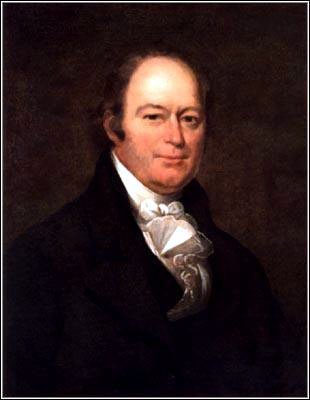 Another issue that created great confusion in Commerce Clause cases of the pre-Civil War period was the relationship between the Clause and the states’ powers of “police.” That term was generally a shorthand way of referring to those powers of internal regulation that everyone understood the states possessed. In Groves v. Slaughter, for example, Justice Baldwin referred to a “regulation of police” as any law with an “object connected with the internal tranquility of the state, the health or morals of the people.”
Another issue that created great confusion in Commerce Clause cases of the pre-Civil War period was the relationship between the Clause and the states’ powers of “police.” That term was generally a shorthand way of referring to those powers of internal regulation that everyone understood the states possessed. In Groves v. Slaughter, for example, Justice Baldwin referred to a “regulation of police” as any law with an “object connected with the internal tranquility of the state, the health or morals of the people.”But the powers of police could potentially come into conflict with the Commerce Clause. Let me use a hypothetical based on modern concerns. Assume a non-tobacco growing state concludes that the use of tobacco is injurious to the health of its citizens. It therefore bans the use of tobacco within the state. Health regulation is a quintessential police power. The Supreme Court had early on recognized that the states could enforce quarantine and health laws without offending the Commerce Clause:
The same bale of goods, the same cask of provisions, or the same ship, that may be the subject of commercial regulation, may also be the vehicle of disease. And the health laws that require them to be stopped and ventilated, are no more intended as regulations of commerce, than the laws which permit their importation, are intended to inoculate the community with disease.
Gibbons v. Ogden (1824) (Johnson, J., concurring).
From this perspective, a member of the Taney court would not have had the slightest doubt that a state could enact my hypothetical statute.
On the other hand, looked at differently, there is not the slightest doubt that this hypothetical law affects interstate commerce, perhaps substantially. (One assumes that Virginia would have screamed bloody murder if a number of northern states had banned the use of tobacco in 1840.) Although the state has not banned the importation of tobacco or tobacco products into the state, clearly no merchant is going to bother to import them, except possibly for transshipment.
Now take it a step further. What if the state bans the possession of tobacco in the state? Again, looked at one way this is a purely “internal” regulation. Looked at another way, the state has, in effect, banned the importation of tobacco, because anyone who does so is immediately guilty of illegal possession.
Finally, what if the state bans the importation of tobacco into the state? Now you have a statute that certainly looks like it is directly regulating interstate commerce. But the motivation and purpose of the law remains (hypothetically) to protect the health of the state’s citizens – an exercise of police power. And if it was constitutionally permissible for the state to ban the use and possession of tobacco, doesn’t it elevate form over substance to say that the state cannot address the problem directly and ban importation as well? And yet, if a line needs to be drawn somewhere, where are you going to draw it if you don’t do so here?
Although a total ban might seem unrealistic, the variations are potentially endless. Our hypothetical state might require that tobacco products be shipped into the state, or sold in-state, only in specified packaging (with, for example, a specified warning label). Or it might require that importers or in-state sellers of tobacco products obtain licenses, pay fees and post bonds to defray consumer health costs. All of these schemes would, as a practical matter, burden interstate commerce to a greater or lesser degree. Again, where and how do you draw the line? Does the degree of burden matter? Does the practical impact on interstate commerce matter? If it does, aren’t you depriving the state of its right to protect the health of its residents? Etc. etc. etc.
The interaction of the exclusivity issue (discussed in the last post) and the police power issue (discussed here) resulted in combinations of views that may seem extremely odd to modern observers. For example, a justice might present an extremely “nationalist” position on the exclusivity issue, asserting that the Commerce Clause gave Congress the exclusive right to regulate international and interstate commerce (whether Congress actually exercised that right or not) and denied the states any authority to do so. At the same time, that justice might have an expansive view of the states’ police powers, believing that a state could properly (using the hypothetical) ban the use and possession of tobacco as a health measure. In short, you wind up with an opinion proclaiming federal exclusivity that contains a police power exception that virtually swallows the rule. Professor Currie has wryly commented on this rather odd result as follows:
The reader may well find the resulting “exclusivity” of congressional authority in the sphere of commerce a peculiar one. If the purpose of the Framers was to create a self-executing safeguard against state interference with commerce, one might expect them to have done so without regard to the name of the power the state purported to exercise.
David P. Currie, The Constitution in the Supreme Court: The First Hundred Years 1789-1888 (Chicago: University of Chicago Press 1985) at 175.
The point for now is that it will be necessary to watch both issues when examining the opinions discussing the Commerce Clause in Groves (and almost any other Commerce Clause opinion of the period). The tension between the two considerations creates a good deal of the confusion (sometimes to the point of incomprehensibility) in the decisions.






No comments:
Post a Comment